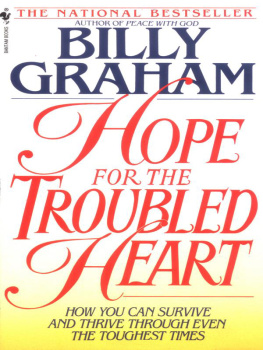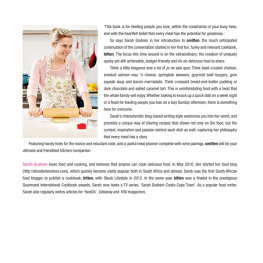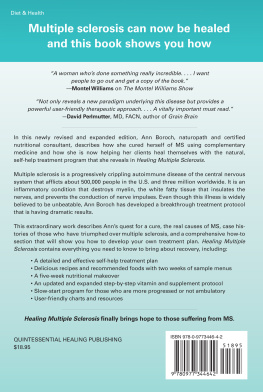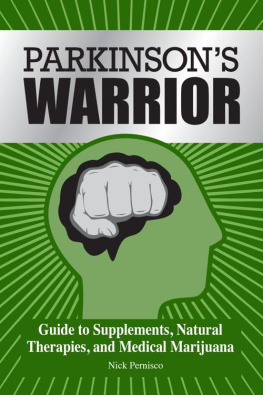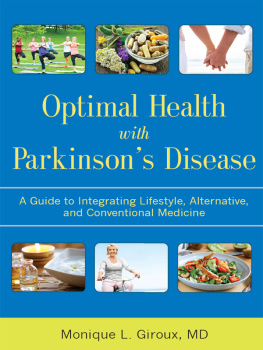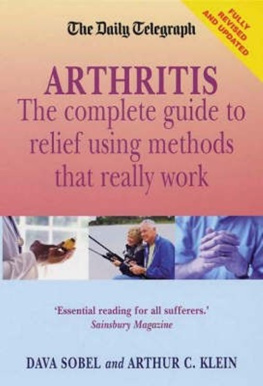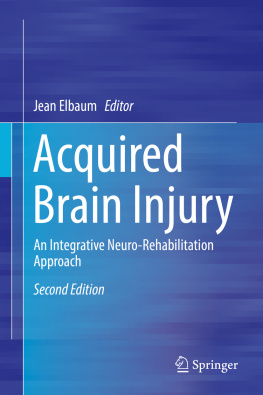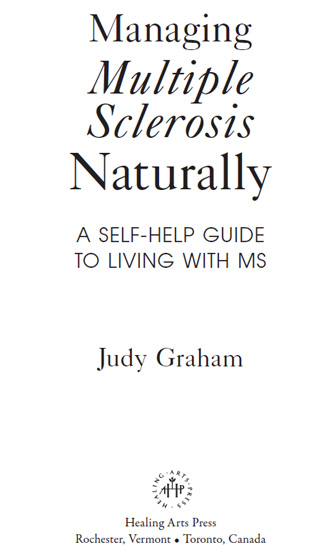
Acknowledgments

THIS BOOK COULD NOT HAVE BEEN WRITTEN written without the help of a great many people. Very little in it is original materialI have simply gathered into one place a number of various bits and pieces researched and written by others about the management of MS. To credit all of those people would fill several pages. Many doctorsboth M.D. and Ph.D.have written papers and books of their own, or given verbal advice. Others, such as Ashton Embry, Ph.D., offer goldmines of information on their websites, listed in the Resources chapter at the back of the book.
Personal thanks are due to Professor Michael Crawford, the late Professor Roy Swank, Professor E. J. Field, the late Dr. David F. Horrobin, Dr. Jurgen Mertin, Dr. John Mansfield, Dr. Patrick Kingsley, Dr. Tom Gilhooly, Dr. Bob Lawrence, Professor George Jelinek, Ashton Embry, Ph.D., and Dr. Terry Wahls, most of whom I have had the privilege to meet or otherwise connect with personally. Two enlightened dentists also belong on this listDrs. Vicky Lee and Jack Levenson.
People with MS who have inspired me by their own personal recovery include the late Roger MacDougall, Dubliner Dermot OConnor, Professor George Jelinek from Australia, Terry Wahls, M.D., Sue Ellen Dickinson, and Gina Kopera, M.H.
I would also like to thank Ann D. Sawyer and Judith E. Bachrach, authors of The MS Recovery Diet, for picking up the ball and running with it so brilliantly after reading the first edition of this book in the 1980s.
I also thank the U.K. Multiple Sclerosis Resource Centre (www.msrc.co.uk) for having such an excellent and informative website, and its predecessor, Action for Research into Multiple Sclerosis, for initiating some of the research mentioned.
I also wish to extend my gratitude to the many people with MS who so kindly allowed me to use their stories. Nearly all of these first appeared in New Pathways, the magazine I edit, which is published by the Multiple Sclerosis Resource Centre. I wish to thank the MSRC and Helen Yates, its chief executive, in particular, for supporting me in writing this book.
I would also like to thank my Pilates teachers, especially Clare Lennard and Adina Thomas, for teaching me so much and helping to keep my body toned; my shiatsu practitioner Michael Rose, who is a genius at what he does; and all the holistic practitioners I have seen over the years, all of whom have helped me, including Functional Medicine expert Dr. Georges Mouton and the Belgian laboratory that routinely tests my blood and urine, Dr. Patrick Kingsley, Dr. Tamara Voronina, and osteopath/reflexologist/acupuncturist Byron Spiers.
Also, many thanks to my editors, Jamaica Burns and Abigail Lewis, for knocking this completely revised and expanded edition into shape.
Contents

Chapter 1
Chapter 2
Chapter 3
Chapter 4
Chapter 5
Chapter 6
Chapter 7
Chapter 8
Chapter 9
Chapter 10
Chapter 11
Chapter 12
Chapter 13
Chapter 14
Chapter 15
Chapter 16
Chapter 17
Chapter 18
Chapter 19
Chapter 20
Chapter 21
Foreword

A WEEK AFTER MY SON was diagnosed with MS in 1995 a friend gave us a book on managing multiple sclerosis by Judy Graham. Up to that time my wife and I were feeling very helpless and full of despair because it seemed there was nothing to be done about MS except hope it didnt progress too fast. The neurologist who had diagnosed my son had not given us any words of encouragement. The best he could muster was to say to my son, Dont buy some bricks and jump off the Bowness Bridge yet.
I literally devoured Judys book, which was clearly written and a wonderful mix of science and practical advice. This was exactly the type of information I was looking for to help guide a course of action to fight our sons MS. Our mood of hopelessness was immediately replaced by one of confidence that MS could be successfully managed.
Ever since that day, Judy Graham has been an icon in our home, and I am most pleased that I have this opportunity to introduce the latest edition of her book on the many ways to fight back against this insidious disease.
Much has changed in the world of multiple sclerosis since 1995, the biggest transformation being the introduction of various drug therapies. Multiple sclerosis is now big business, and drug therapy is essentially the only type of treatment option that is discussed by neurologists and national MS societies. Unfortunately, the drugs have a modest effect at best and only slightly slow progression for most. They also come with a host of semi-toxic side effects.
A person with MS should not rely solely on one of the current drug therapies to ensure they will not progress to severe disabilities. It is fine to use a drug therapy, but it is essential to use additional therapies as well.
In this new edition Judy Graham provides a comprehensive compilation of all the various therapies that have been proposed to help slow MS progression and to relieve symptoms associated with the disease. Notably Judy does not push one therapy over another but objectively describes each one and provides appropriate scientific data and references for many. This is exactly what every person with MS needs in order to make an informed decision as to what therapies exist, which might be worth trying, and which ones might be tried first.
Often experiential accounts are provided with the description of the therapies, and these are always enlightening. I have always believed that if one person with MS has found value in a therapy then there is a chance it may well help another person who tries it. In most cases, one has much to gain and little to lose in trying the various therapies that Judy has chosen to include.
There is no doubt that this book is by far the most comprehensive, objective, and scientifically sound overview of all the options a person with MS has to help keep the MS disease process well controlled.
Judy has done all persons with MS a great service by taking the time and energy to write such a wonderful book. I have no doubt it will help innumerable people lead healthier, much more satisfying lives than if they only listen to what their neurologist has to offer.
Thanks, Judy. Your iconic status remains intact.
ASHTON EMBRY, PH.D.
Ashton Embry, Ph.D., a research scientist for more than forty years, plunged into the scientific literature on MS following his sons diagnosis. Together with his wife and a group of others affected by MS, Embry founded the charity DIRECT-MS to make the information he discovered freely available to all those in need of it. Their website, www.direct-ms.org, provides reliable, science-based information on the role that nutritional factors play in MS. Today, Embrys son, Matt, is in excellent health with no MS symptoms.
Preface to the New Edition

I WAS DIAGNOSED with multiple sclerosis (MS) in 1974 at age twenty-six, and I am writing this in 2010thirty-six years later and sixty-three years old! During the intervening years I have had a full-time career as a TV producer, radio broadcaster, and print journalist. I also raised a wonderful son, Pascal. For the past ten years, I have been editing a progressive magazine on MS called
Next page

